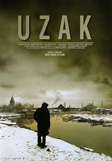
|
|
'Distant'
Close to Perfect
Desson Thomson, Washington Post (USA), July 23, 2004
"DISTANT," a moving character
piece from Nuri Bilge Ceylan, clearly derives some of its sensibilities
from the hallowed cinematic churches of Andrei Tarkovsky and Yasujiro
Ozu (and there's a little Chekhov, too, in his approach). Following the
protracted tension between two lonely Turkish men, it at first seems to
be about nothing, a minute-to-minute observation of two uneventful, frustrating
lives.
Ultimately,
it becomes a movie about the feeling of being alive, the sensation of
existence. It's a movie, in a way, about everything.
One of the men is Mahmut (Muzaffer Ozdemir), a bearded, quiet photographer
in Istanbul who has divorced his wife. He has a job, taking shots of objects
for a commercial business. But he's essentially alone and lonely. There
is a woman with whom he spends time on occasion; and he reaches for the
odd porn video, too. Surrounded by books and photographs, he keeps a clean
house. He's set in his ways and heading nowhere.
When his younger cousin Yusuf (Mehmet Emin Toprak) comes to visit, Mahmut's
comfortably self-contained routine is broken. The visitor, who hails from
the same village as Mahmut, has lost his factory job. He hangs around
the port, looking for any kind of work. His hope is to find a job on a
luxury cruiser that travels around the world. He has no luck. There's
a nationwide recession.
Yusuf, not a particularly attractive man with an ungainly bump on the
side of his face, is a slob who smokes all over the house, leaves food
lying around and, when he's not looking for a job, starts following a
woman around town who strikes his fancy.
Mahmut is stuck with him.
There are seemingly banal events that, because of the claustrophobic nature
of their new, mutual existence, become bigger. There's a mouse loose in
the house, for instance, for which Mahmut has set a trap of sticky paper.
Its unseen presence is another source of tension. And in a passingly comical
moment, Mahmut gets caught in the sticky stuff.
"Distant," which won the grand jury prize at Cannes in 2003
for its cinematography and the acting prize for the two principal performances,
works subtly on the senses and the brain. A story that observes silent
behavior as much as talk, that looks down streets and sees things we normally
wouldn't notice, it's a movie of powerful accumulation. The compositions
are masterful, especially the snow-covered scenes in Istanbul and, most
memorably, the spectacle of an overturned ship in the wintry harbor.
It's clear that Ceylan, who wrote, directed, shot, produced and co-edited
this film, is part of the exclusive circle of global cinematic visionaries.
(His earlier "Clouds of May," about village life in Turkey,
which was shown at Cannes, too, is another stunner.) But his work is not
gratuitous artistry. Everything blends into one touching experience. You
could never expect, for example, that the sight of a mouse caught on sticky
paper could move you to tears. In Ceylan's movie, you're seeing more than
a pest that has been caught. The animal is a telling metaphor for Yusuf's
life, and yet another echo of the distance between people, around people,
within people and everywhere.
|

